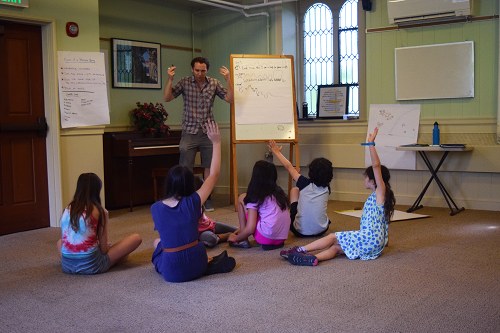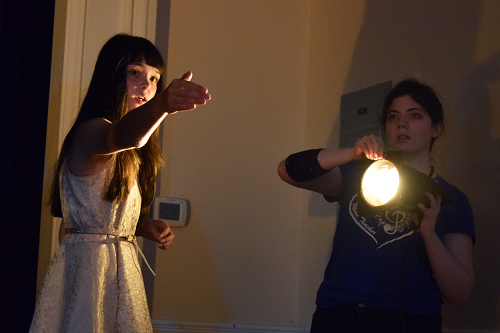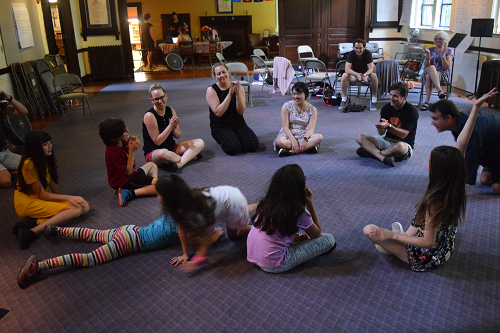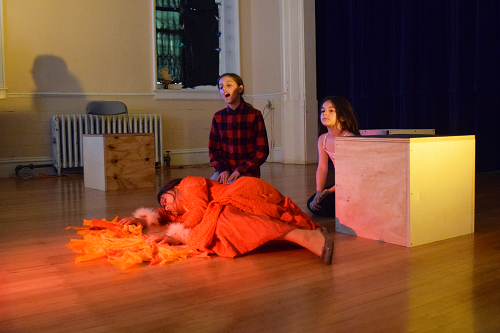Opera Education Grants Self-Acceptance: A Perspective of a Former Over-Thinker
In the summer of 2015, I embarked on my journey to become an opera singer. I was accepted to The Boston Conservatory for vocal performance, and I honestly thought my career would be an easy shot from there. However, I found myself nervously querying my google search engine and coming across articles with titles like So You Want to Be an Opera Singer?, Why It’s More Difficult Than Ever to Become an Opera Singer, and the most inspiring of all I Could Have Been a Great Opera Singer, If I Were Rich. Looking back now, I certainly shouldn’t have based all of my knowledge about the opera industry on these discouraging articles, but it became clear that my career path would not be an easy one; and that I would have to buckle down and gain a competitive spirit if I wanted to make it big.
Thankfully, my mentors at the Conservatory helped me sift through the plethora of information and myths surrounding the art form, and introduced me to many ways I could be involved and personally fulfilled within the business, other than pursuing a life on the stage. I began exploring opera from a new angle, gaining experience in stage management and directing. This new territory introduced discussions including budgets, contracts, scheduling, and design. Most of all, I was amazed by the collaborative process. I discovered the beauty of production meetings. Stage managers, stage/artistic directors, costume, light and set designers gathered as a single congregation in a safe place, with complete devotion to their art form. Colleagues freely exchanged tokens of invention and imagination from across the table. To me it resembled a type of communion, and became a spiritual space for me to learn and observe. From that point on, one thing was clear to me—I didn’t want to be merely an observer. I wanted to be a part of the conversation.
 Now, with my Bachelor of Music degree in hand, and a new plan to enter into the opera business, I was selected to be the summer Education and Community Engagement Intern at Boston Lyric Opera. I looked forward to exploring arts administration, specifically interested in initiatives that seek to engage diverse communities. As an active member of the Boston music community for the past four years, I was already aware of many of BLO’s education programs of which I was excited to be a part of from a different perspective. Personally, I wished to return to an infatuation with opera that I had when I first started singing classical music, for which I felt had been diminished by the pressures of competition and perfection building a career in opera. I wanted to return to the fundamentals of opera which, in my opinion, have been the same since the art form’s beginning in the 16th century: creation and inspiration. My perspective was recently reinforced as I assisted with BLO’s summer professional development for teachers, Opera Creation Boot Camp, and the concurrently running Opera Camp, co-hosted by a local youth choral organization, VOICES Boston.
Now, with my Bachelor of Music degree in hand, and a new plan to enter into the opera business, I was selected to be the summer Education and Community Engagement Intern at Boston Lyric Opera. I looked forward to exploring arts administration, specifically interested in initiatives that seek to engage diverse communities. As an active member of the Boston music community for the past four years, I was already aware of many of BLO’s education programs of which I was excited to be a part of from a different perspective. Personally, I wished to return to an infatuation with opera that I had when I first started singing classical music, for which I felt had been diminished by the pressures of competition and perfection building a career in opera. I wanted to return to the fundamentals of opera which, in my opinion, have been the same since the art form’s beginning in the 16th century: creation and inspiration. My perspective was recently reinforced as I assisted with BLO’s summer professional development for teachers, Opera Creation Boot Camp, and the concurrently running Opera Camp, co-hosted by a local youth choral organization, VOICES Boston.

With eight teacher participants and six youth participants, the intimate atmosphere was ideal for journeys of self-discovery and musical creation for youth and educators alike. I was inspired by the level of artistic freedom granted to the youth participants. From start to finish, they created a fun, quirky opera called The Harp: A Tale to Remember, inspired by a picture chosen from the book, The Mysteries of Harris Burdick by Chris Van Allsburg. I was impressed with how fast the opera came together—from the storyline, music, and libretto, to character development, staging, and costumes—all in only five days! The teacher participants of the Opera Creation Boot Camp guided the youth in explorations of their own creativity, including lighting design and set construction. Perhaps more importantly, the kids simultaneously learned the skill of collaboration.

Throughout the week, I observed the teacher participants, Master Teaching Artists, and Camp Faculty encouraging the youth to be honest, committed, and courageous in their risk-taking, qualities that I believe are crucial for liberated artistic creation and overall self-acceptance. The program instills in the youth that every role in the production is equal, as they were given the chance to be costume, light or production designers, as well as performing in the show. After the youth premiered their brand new opera in front of parents and friends, they expressed pride and satisfaction in their work. The opportunity for me to observe and support Opera Camp and Opera Creation Boot Camp reconfirms for me that opera at any level begins and ends with Creation and Inspiration. More importantly, it demonstrates that opera allows for unlimited possibilities springing in every direction.

Individual desires, talents, life experiences, and emotional resilience shape each of us into unique aspirants. I believe that if I had an opportunity like Opera Camp when I was a kid, it would have not only have drawn out of me my passion for opera, but also perhaps granted me a level of self-acceptance that I desperately needed as a young singer. Observing the process the youth went through during Opera Camp has allowed me to accept my own non-linear process as I embark on the next steps in my professional career. I’m still navigating my path, meanwhile granting myself permission to not have all the answers yet. I’m reassured, however, that creation and inspiration are a driving force throughout the arts industry, and will continue to be a guiding hand as I move forward. My time as an intern at Boston Lyric Opera has been influential amid this personal journey, and has given me a new outlook on the opera industry and my future.
In the Frame:
Students work with a teacher to develop a melody and libretto for their opera. | Student directs teacher while developing the lighting for their performance. | Students and teachers applaud a students idea. | Students perform their opera with costumes and props.
Photos by: Madison Florence

